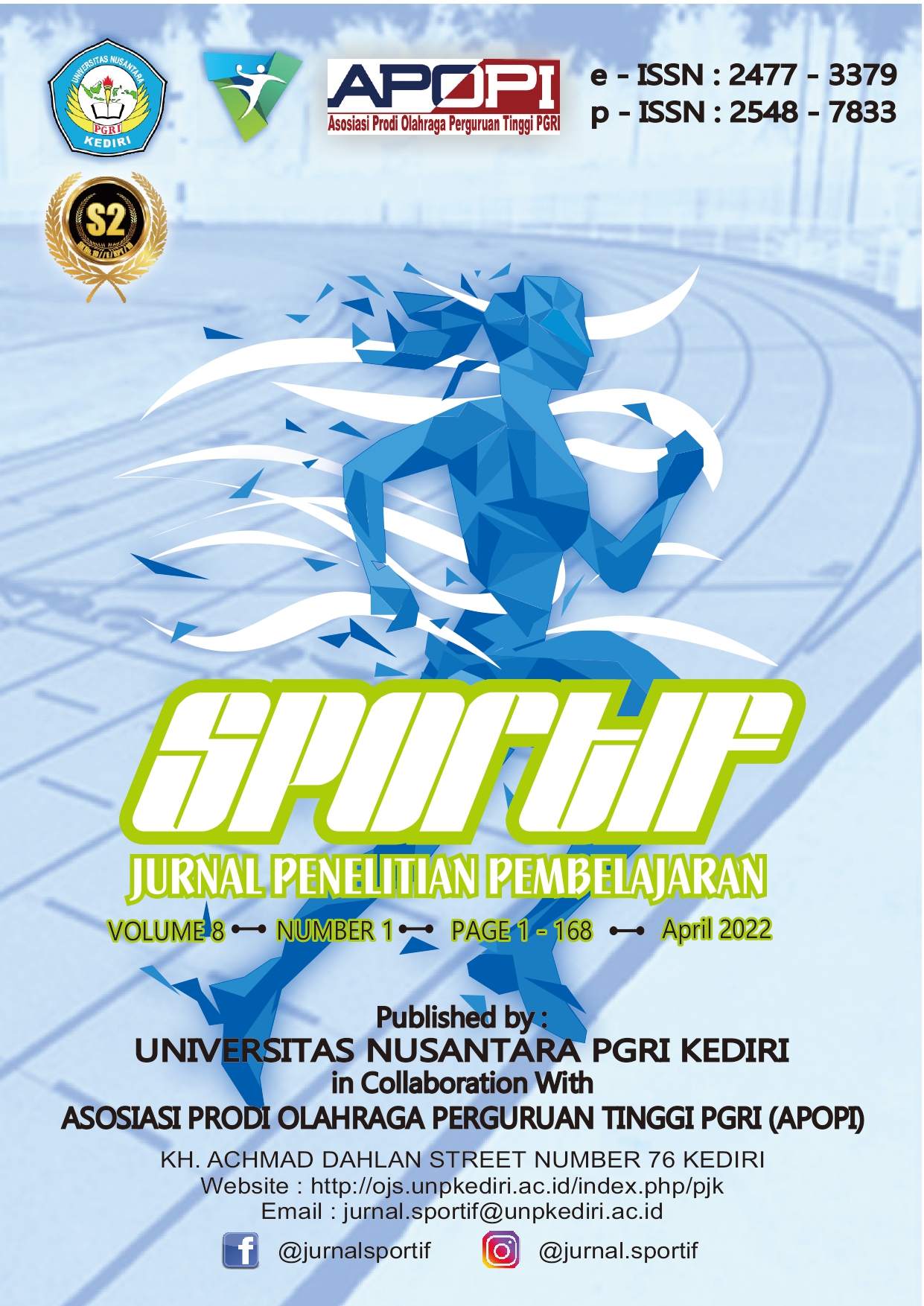Abstract
This research was conducted based on problems in learning in the development of physical motor skills, especially the gross motor skills of Asy Syaffa Kindergarten students. This study aims to determine the use of Si Buyung's gymnastics in improving gross motor skills in early childhood in Asy Syaffa Kindergarten. The experimental method was applied in this study by giving 14 treatments, including pretest and posttest. The research subjects were 24 students with the sampling technique, namely purposive sampling. This research instrument uses the Gross Motor Test, which consists of a 50-meter sprint test, Dodgin run, Standing Broad Jump test, Soft Ball Throw test, Wall Pass test, Medicine Ball put test. The results of hypothesis testing found that there was an effect of Si Buyung's gymnastics on the gross motor skills of early childhood. With the conclusion criteria t count > t table, 4,062 > 2,068 and the value of sig. 2-tailed 0.000 < 0.05 so that the hypothesis is accepted. So this study proves that Si Buyung's gymnastics can improve motoric movement in early childhood. The implications of this research are expected to be an alternative for kindergarten teachers as a learning approach to developing children's gross motor movements.
References
Agusriani, A. (2015). Kepercayaan diri melalui bermain gerak. Jurnal Pendidikan Usia Dini, 9(1), 1–18.
Andiyanto, T. (2018). Konsep Pendidikan Pranatal, Postnatal, Dan Pendidikan Sepanjang Hayat. Elementary: Jurnal Ilmiah Pendidikan Dasar, 4(2), 195. https://doi.org/10.32332/elementary.v4i2.1236
Cheung, R. H. P. (2010). Designing movement activities to develop children’s creativity in early childhood education. Early Child Development and Care, 180(3), 377–385. https://doi.org/10.1080/03004430801931196
Hasanah, U. (2016). Pengembangan kemampuan fisik motorik melalui permainan tradisional bagi anak usia dini. Jurnal Pendidikan Anak, 5(1), 717–733. https://doi.org/10.21831/jpa.v5i1.12368
Humaedi, H., Saparia, A., Nirmala, B., & Abduh, I. (2021). Deteksi dini motorik kasar pada anak usia 4-6 Tahun. Jurnal Obsesi : Jurnal Pendidikan Anak Usia Dini, 6(1), 558–564. https://doi.org/10.31004/obsesi.v6i1.1368
Kadi, Halida, & Yuniarni, D. (2018). Senam irama dalam mengembangkan kecerdasan kinestetik anak usia 5-6 Tahun Di Tk Karya Yosef. Jurnal Pendidikan Dan Pembelajaran, 7(6), 1–9. http://jurnal.untan.ac.id/index.php/jpdpb/article/view/25980
Katagiri, M., Ito, H., Murayama, Y., Hamada, M., Nakajima, S., Takayanagi, N., Uemiya, A., Myogan, M., Nakai, A., & Tsujii, M. (2021). Fine and gross motor skills predict later psychosocial maladaptation and academic achievement. Brain and Development, 43(5), 605–615. https://doi.org/10.1016/j.braindev.2021.01.003
Kustati, Hartiwan, U., & Supriyono. (2016). Peningkatan hasil belajar senam ritmik si buyung menggunakan lagu potong bebek angsa kelas 1 Sd Negeri 1 Notog Kecamatan Patikraja Kabupaten Banyumas Tahun Ajaran 2016. Journal of Physical Education Health and Sport, 3(1), 22–32. https://doi.org/10.15294/jpehs.v3i1.6499
Lailaturohmah, Fitriani, R., & Andera, N. A. (2021). Pengaruh pemberian terapi brain gym terhadap perkembangan motrik kasar pada anak Usia 4-5 Tahun di TK Plus Wahidiyah Desa Bandar Lor Kecamatan Mojoroto Kota Kediri. Jurnal Bidan Komunitas, 4(3), 126–132. https://doi.org/https://doi.org/10.33085/jbk.v4i3.5002
Litem, G., Widiantari, N. L. G., Prananta, I. G. N. A. C., Laksana, A. A. N. P., Citrawan, I. W., & Artawawan, I. K. S. (2022). Analisis Faktor-Faktor yang Mempengaruhi Hasil Belajar Pendidikan Jasmani Olahraga dan Kesehatan Pada Siswa Kelas VIII di SMPK 2 Harapan Untal-Untal, Dalung Kuta Utara, Badung. Jurnal Pendidikan Kesehatan Rekreasi, 8(1), 153–161. https://doi.org/DOI : 10.5281/zenodo.5881371
Maciejewski, M. L. (2020). Quasi-experimental design. Biostatistics and Epidemiology, 4(1), 38–47. https://doi.org/10.1080/24709360.2018.1477468
Mawarti, S., Sukamti, E. R., & Prasetyo, Y. (2012). Pembuatan Paket Senam Si Buyung untuk Guru TK.
Meijer, A., Pouwels, P. J. W., Smith, J., Visscher, C., Bosker, R. J., Hartman, E., Oosterlaan, J., & Königs, M. (2021). The relationship between white matter microstructure, cardiovascular fitness, gross motor skills, and neurocognitive functioning in children. Journal of Neuroscience Research, 99(9), 2201–2215. https://doi.org/10.1002/jnr.24851
Montolalu, B. E. . (2011). Materi Pokok Bermaindan Permainan Anak. Universitas Terbuka.
Pradipta, G. D., & Sukoco, P. (2013). Model senam si buyung untuk pembelajaran motorik kasar pada siswa taman kanak-kanak. Jurnal Keolahragaan, 1(C2), 130–141.
Rahmawati, R., & Simatupang, N. D. (2015). Senam si buyung dengan metode demonstrasi dalam pengembangan motorik kasar anak. PAUD Teratai, 4(2), 1–6.
Sasi, D. N. (2011). Meningkatkan kemampuan gerak dasar dan kognitif anak melalui senam irama. Jurnal Penelitian Pendidikan, Edisi Khus(2), 46–52.
Shala, M. (2009). Assessing gross motor skills of kosovar preschool children. Early Child Development and Care, 179(7), 969–976. https://doi.org/10.1080/03004430701667452
Sofyan, D., Fauzi, R. S., Sahudi, U., Rustandi, E., Priyono, A., & Indrayogi. (2022). Alternatif meningkatkan kemampuan motorik siswa sekaloh dasar: pendekatan bermain. Jurnal Cakrawal Pendas, 8(2), 438–448. https://doi.org/http://dx.doi.org/10.31949/jcp.v8i2.2260
Ulfah, A. A., Dimyati, & Putra, A. J. A. (2021). Analisis penerapan senam irama dalam meningkatkan kemampuan motorik kasar anak usia dini. Jurnal Obsesi: Jurnal Pendidikan Anak Usia Dini, 5(2), 1844–1852. https://doi.org/10.31004/obsesi.v5i2.993
Veldman, S. L. C., Santos, R., Jones, R. A., Sousa-Sá, E., & Okely, A. D. (2019). Associations between gross motor skills and cognitive development in toddlers. Early Human Development, 132(April), 39–44. https://doi.org/10.1016/j.earlhumdev.2019.04.005
Yuhety, H., Miarso, Y., & Baslemah, A. (2008). Indikator mutu program pendidikan sepanjang hayat. JIV-Jurnal Ilmiah Visi, 3(2), 150–170. https://doi.org/10.21009/jiv.0302.6
Yunus, M., & Wedi, A. (2018). Konsep dan penerapan pendidikan sepanjang hayat dalam keluarga. JINOTEP (Jurnal Inovasi Teknologi Pembelajaran), 5(1), 31–37.
Authors who publish with this journal agree to the following terms:
- Copyright on any article is retained by the author(s).
- The author grants the journal, the right of first publication with the work simultaneously licensed under a Creative Commons Attribution License that allows others to share the work with an acknowledgment of the work’s authorship and initial publication in this journal.
- Authors are able to enter into separate, additional contractual arrangements for the non-exclusive distribution of the journal’s published version of the work (e.g., post it to an institutional repository or publish it in a book), with an acknowledgment of its initial publication in this journal.
- Authors are permitted and encouraged to post their work online (e.g., in institutional repositories or on their website) prior to and during the submission process, as it can lead to productive exchanges, as well as earlier and greater citation of published work.
- The article and any associated published material is distributed under the Creative Commons Attribution-ShareAlike 4.0 International License





